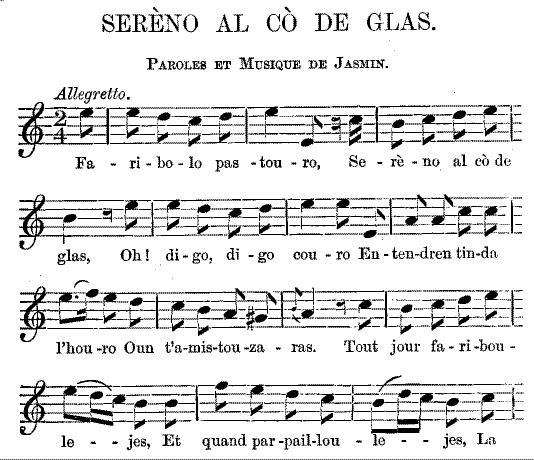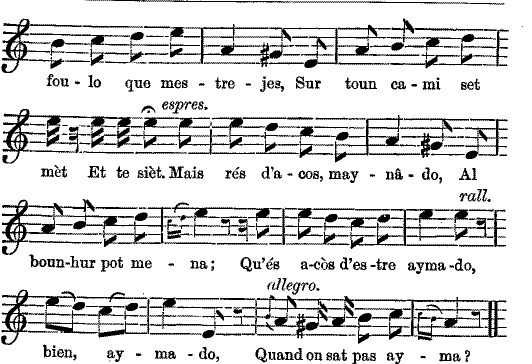Marcel started up in a rage, and drawing himself to his full height, he strode to Pascal. "Peasant!" he said, "thou hast supplied my place too quickly," and then dealt him a thundering blow between the eyes. Pascal was not felled; he raised his arm, and his fist descended on Marcel's head like a bolt. The soldier attempted to draw his sabre. When Pascal saw this, he closed with Marcel, grasped him in his arms, and dashed him to the ground, crushed and senseless.
Marcel was about to rise to renew the duel, when suddenly Montluc, who happened to be passing with the Baron of Roquefort, stepped forward and sternly ordered the combatants to separate.
This terrible encounter put an end to the fête. The girls fled like frightened doves. The young men escorted Pascal to his home preceded by the fifers. Marcel was not discouraged. On recovering his speech, he stammered out, grinding his teeth: "They shall pay clearly for this jesting; Franconnette shall have no other husband than myself."
Many months passed. The harvest was gathered in. There were no more out-door fêtes or dances. The villagers of Estanquet assembled round their firesides. Christmas arrived with it games and carol-singing. Then came the Feast of Lovers, called the Buscou,4 on the last day of the year, where, in a large chamber, some hundred distaffs were turning, and boys and girls, with nimble fingers, were winding thread of the finest flax. Franconnette was there, and appointed queen of the games. After the winding was over, the songs and dances began to the music of a tambourin. The queen, admired by all, sang and danced like the rest.
Pascal was not there; his mother was poor, and she endeavoured to persuade him to remain at home and work. After a short struggle with himself, Pascal yielded. He turned aside to his forge in silent dejection; and soon the anvil was ringing and the sparks were flying, while away down in the village the busking went merrily on. "If the prettiest were always the most sensible," says Jasmin, "how much my Franconnette might have accomplished;" but instead of this, she flitted from place to place, idle and gay, jesting, singing, dancing, and, as usual, bewitching all.
Then Thomas, Pascal's friend, asked leave to sing a few verses; and, fixing his keen eyes upon the coquette, he began in tones of lute-like sweetness the following song, entitled 'The Syren with a Heart of Ice.' We have translated it, as nearly as possible, from the Gascon dialect.
"Faribolo pastouro,
Serèno al cò de glas,
Oh! digo, digo couro
Entendren tinda l'houro
Oun t'amistouzaras.
Toutjour fariboulejes,
Et quand parpailloulejes
La foulo que mestrejes,
Sur toun cami set mèt
Et te siet.
Mais rés d'acos, maynådo,
Al bounhur pot mena;
Qu'és acòs d'estre aymado,
Quand on sat pas ayma?"
"Wayward shepherd maid,Such poetry however defies translation. The more exquisite the mastery of a writer over his own language, the more difficult it is to reproduce it in another. But the spirit of the song is in Miss Costello's translation,5 as given in Franconnette at the close of this volume.
Syren with heart of ice,
Oh! tell us, tell us! when
We listen for the hour
When thou shalt feel
Ever so free and gay,
And when you flutter o'er
The number you subdue,
Upon thy path they fall
At thy feet.
But nothing comes of this, young maid,
To happiness it never leads;
What is it to be loved like this
If you ne'er can love again?"
When reciting Franconnette, Jasmin usually sang The Syren to music of his own composition. We accordingly
annex his music.

All were transported with admiration at the beautiful song. When Thomas had finished, loud shouts were raised for the name of the poet. "Who had composed this beautiful lay?" "It is Pascal," replied Thomas. "Bravo, Pascal! Long live Pascal! "was the cry of the young people. Franconnette was unwontedly touched by the song. "But where is Pascal?" she said. "If he loves, why does he not appear?" "Oh," said Laurent, another of his rivals, in a jealous and piqued tone, "he is too poor, he is obliged to stay at home, his father is so infirm that he lives upon alms!" "You lie," cried Thomas. "Pascal is unfortunate; he has been
| Previous chapter/page | Back | Home | Email this | Search | Discuss | Next chapter/page |